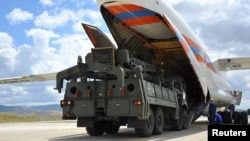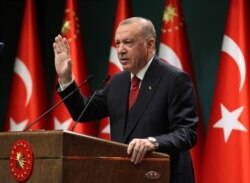The United States is warning Turkey against taking any additional steps to operationalize its Russian-made S-400 air defense system, warning there will be consequences even if that risks pushing Ankara closer to an alliance with Moscow.
Relations between Washington and Ankara, which have soured in recent years, hit a new low last week when Turkish President Recep Tayyip Erdogan confirmed his military had tested the Russian-made system.
The announcement sparked condemnation from U.S. defense officials. A key State Department official said Wednesday that the risk of new sanctions against Turkey was “very real.”
"Sanctions is very much something that is on the table," Assistant Secretary of State R. Clarke Cooper told reporters.
Not compatible
Not only is the S-400 not interoperable with U.S. platforms, Cooper said, but "it is not interoperable with NATO."
"Operationalizing such an asset or system incurs further risk of sanctions and further risks of restrictions," he said.
Turkey signed a deal to buy the S-400 air defense system from Russia in 2017. The first deliveries began in July 2019.
Since then, the U.S. has suspended Turkey from participation in its F-35 stealth fighter jet program and has repeatedly threatened sanctions against Ankara, though none have been levied.
Cooper on Wednesday indicated U.S. patience with Ankara might be running out.
"What Turkey squandered over the last year is an opportunity to reconcile and get back into a good space and a good path with the United States and NATO,” he said.
U.S. officials warn Turkey’s use of the advanced Russian radar technology could compromise NATO’s military systems and could be used to target NATO jets in Turkey, including the F-35.
Erdogan, however, has brushed aside the warnings, telling reporters last week that the U.S. stance “absolutely does not concern us.”
Despite the apparent impasse, the U.S. has not given up on finding a way to bring Ankara back into the fold.
Cooper, recently back from a visit to Greece and Bulgaria, said the U.S. has encouraged both countries, as well as other NATO allies, to do what they can to “make sure that Turkey remains in the West.”
'Significant roles' for Turkey
"It's to the alliance's detriment to not have Turkey inside the alliance,” Cooper said. “There are significant roles that they still maintain with us … in the greater security of Europe and in the region."
Whether such efforts can overcome what U.S. officials like Cooper describe as “disruptive actions coming from Moscow to cleave us apart” remains to be seen.
If they fail, U.S. officials caution that Ankara, like the U.S. and NATO, could suffer.
"The only beneficiary of Turkey leaving the West or being cleaved away from Europe would be Moscow," Cooper said. "There would be a diminishing return, even for Turkey."





